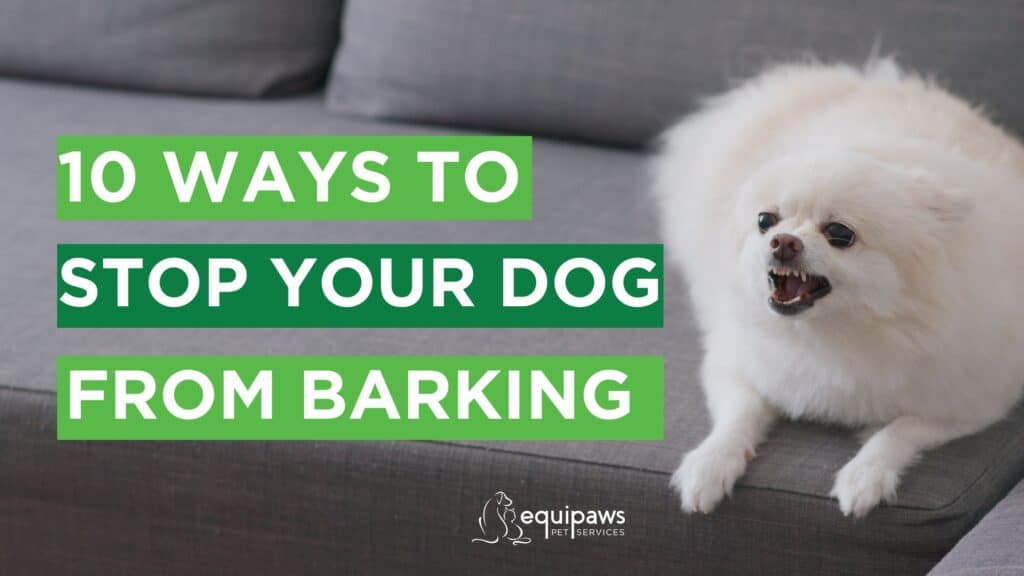Stop your dog from barking with these tips
Does your dog bark incessantly and you don’t know how to make it stop? If your dog won’t stop barking, it can be frustrating and concerning for you and your neighbors. Barking is a natural way for dogs to communicate, but it can become a problem when it’s excessive.
Fortunately, there are several things you can do to help stop your dog from barking. Firstly, it’s essential to understand why dogs bark in the first place and to make sure you are not unknowingly reinforcing the behavior.
Here are possible reasons why your dog may not stop barking:
- Separation anxiety: Dogs that experience separation anxiety may bark excessively when left alone.
- Boredom: Dogs who are bored may bark to seek attention or to release their pent-up energy.
- Fear: If your dog is afraid of something, such as loud noises or other animals, they may bark to alert you to the danger or they may not stop barking until the object causing the fear retreats.
- Attention-seeking: If your dog is not getting enough attention, they may bark to get your attention.
- Hunger: If your dog is hungry, they may bark to let you know that they want food.
- Medical issues: Some medical conditions, such as pain or discomfort, can cause dogs to bark excessively.
To help stop your dog from barking, you can try the following tips:
1. Provide distractions:
Dogs who are bored may bark less if they have plenty of toys to play with or if you engage them in play. If your dog is barking because of external noises, leaving the TV or radio on can help drown out the sounds during the day when you’re out of your home.
2. Keep your dog active:
Regular exercise and playtime can help to reduce your dog’s barking. Take your dog for walks or runs throughout the day, or visit a dog park if possible and help your dog make friends with like-minded doggies with the same energy. You can also book the services of a dog walker to help your pups get their exercise if you’re busy at work. We’re always happy to help!
3. Change up their routine:
Dogs can get bored easily, so changing up their exercise routine can help to keep them entertained. If your dog is usually kept inside, take them outside for a while. If they are outside all day, let them come inside to play.
4. Avoid rewarding barking:
Do not give your dog treats or attention when they are barking, and don’t yell at them to stop. This can reinforce the behavior. Instead, reward them when they are quiet and calm.
5. Teach the “quiet” command to stop your dog from barking:
Training your dog to stop barking on command can be helpful. After a few barks, say “quiet” and reward your dog with treats and praise when they stop barking. Using a down/stay command can help in this situation too, as most dogs will quiet down. There are plenty of step-by-step tutorials for teaching the quiet command online to help!
6. Remove the cause of the barking:
If your dog is barking at something specific, such as people walking by the window, try blocking their view or playing white noise to distract them while you work on desensitizing them from the stimulus that causes the barking.
7. Desensitize dogs to stop barking:
You can help dogs to stop barking by desensitizing them to their triggers gradually. This takes some time but is well worth it. If your dog won’t stop barking at other dogs on walks, enlist the help of a friend with a dog. Take a lot of delicious treats with you and have your friend stay far enough away from you with their dog so your pup doesn’t notice them right away. Have your friend walk by with their dog, giving plenty of treats and maintaining eye contact with your pup. Stop feeding treats once your friend and their dog are gone. Do this a couple of times, and keep doing it over several weeks until the barking stops.
8. Maintain a consistent daily schedule:
This is counter to number four, but dogs thrive on routine, so it’s essential to keep a consistent schedule for feeding, exercise, and playtime. This stability can reduce anxiety in some dogs and prevent dogs barking for their dinner, for example.
9. Socialize your dog to stop them from barking:
Dogs that are socialized to new experiences and sounds are less likely to bark excessively. When you are raising a puppy, make sure to take them to dog-friendly events or change up their walking route to introduce them to new sights and sounds, reinforcing good behavior with treats.
10. Hire a certified dog trainer:
If none of the tips we provided worked, or if you just want hands-on guidance, there are many wonderful dog trainers in Miami who can help you help your dog to stop barking excessively.
Remember, dogs naturally bark to protect their territory, sense danger, communicate, express frustration, anxiety or pain, say hello, seek attention, or demand to be let outside. Identifying and understanding the cause of your dog’s barking can help you determine the best approach to stop it. By understanding why your dog is barking and following these tips, you can help your dog to stop barking excessively and enjoy a happier, more peaceful life.



